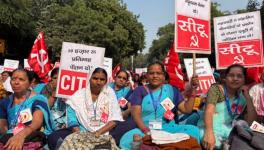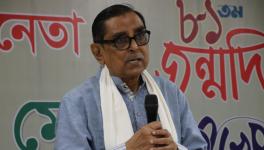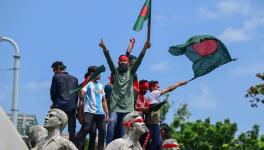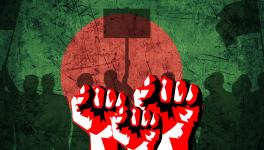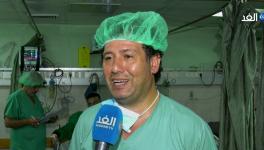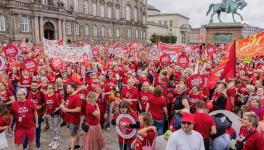Health Workers Left in the Lurch as Pandemic Spreads in Bangladesh
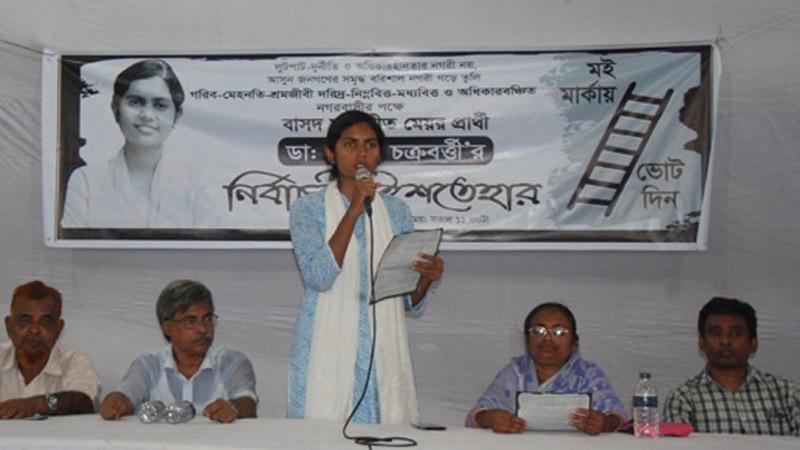
International Secretary of the Socialist Student Front in Bangladesh, Manisha Chakraborty.
Bangladesh continues to see a high number of COVID-19 cases even two weeks after restrictions were eased. The first case was reported on March and restrictions were in place til May 31. Activist groups had raised concerns that the restrictions were eased without adequate preparations being put in place. Peoples Dispatch spoke to Manisha Chakraborty, International Secretary of the Socialist Student Front, shortly after the restrictions were eased to understand the situation.
Peoples Dispatch (PD): What is the situation in Bangladesh after the government declared the lifting of the nationwide restrictons?
Manisha Chakraborty (MC): In Bangladesh, the government has been lagging behind from the beginning in resistance to the COVID-19 pandemic. We detected our first COVID-19 patient on March 8, but no government preparations started in March due to the ruling party, Bangladesh Awami League’s preparations for the one hundredth birthday of Sheikh Mujibur Rahman.
Our government didn’t even declare a lockdown; they declared a general holiday to fight COVID-19 as they weren’t ready to give food support to the poor. The minimal amount of food support they gave to the people was more for show, and orchestrated with multidimensional corruption.
Right now, Bangladesh is climbing the ladder in terms of the number of infections and deaths due to COVID-19. The whole scenario is pretty mismanaged as the government has opened all the offices but the public transport capacity remains the same as before. So it’s very hard to maintain physical distance in such a densely populated country with everything open. The ticket price of public transport has been raised upto 60%. So the public has been burdened with the risk of death, and that too, at a high price.
PD: Garment and health workers in Bangladesh are reportedly being denied wages which had prompted widespread protests in April. Nearly ten thousand workers recently protested against the non-payment of their wages. Why is the government failing to assist these workers?
MC: In the parliament of Bangladesh, almost 80% of our members of parliament belong to the category of businessmen. So, like any other capitalist country, the priorities of legislation always favor the rich, not the poor.
At the start of the COVID 19 pandemic, the first special budget allocation of 5,000 crore taka (USD 587 million) was given to the garments owners in the end of March so that they can pay their workers and keep them safe. But most of them didn’t pay the workers even in May which led to countrywide workers’ protests before Eid-ul-Adha festival, demanding wages and bonus.
The factory owners responded by shutting down factories, denying wages and laying-off workers. They sacked hundreds of workers in different factories to keep their profits up. They also used police and other forces to dismantle the protests and even charged the protesting workers with criminal cases.
It is an irony that even during this humanitarian crisis faced by the workers due to the COVID-19 pandemic, the factory owners didn’t forget profits. It only exposes their naked greed brutally designed by capitalism. Even in the case of health workers, who are the frontline fighters in this pandemic, the private hospital owners have been indulging in retrenchments and salary cuts of health workers. The government has not yet intervened in this matter. Most of the private hospital owners are also closely related with the ruling party.
PD: Doctors’ groups have also complained about facing harassment while demanding personal protective equipment (PPE). What is the condition of hospitals and other health centers in the country?
MC: The government didn’t supply any Personal Protective Equipment (PPE) to any hospital till April. The PPEs and masks they eventually supplied were of very low quality and doctors became infected even while wearing them. Now, more than a thousand doctors are infected in Bangladesh. The number of infected nurses and other health workers is also in the thousands. The health workers are taking the greatest risk but aren’t being given health insurance, and neither are their health expenditures being taken up by the government.
Moreover, a budget of only 100 crores (USD 11.7 million) has been declared as compensation for health workers, which is too small an amount. We have a population of 180 million but the number of ventilators for life support is about 550, including government and non-government hospitals. Among these, many hospitals have been denying treatment to COVID-19 patients and indulging in harassment of sick people. The treatment for COVID-19 patients is institutionally being taken up in district hospitals but not at the sub district (upazillas) level.
The number of testing centers in Bangladesh is only 41, which is too inadequate for a country of 180 million. While doctors and health workers are putting up a brave fight, the long legacy of low health budgets spanning decades and the lack of infrastructures and modern machines is a big barrier for them.
Get the latest reports & analysis with people's perspective on Protests, movements & deep analytical videos, discussions of the current affairs in your Telegram app. Subscribe to NewsClick's Telegram channel & get Real-Time updates on stories, as they get published on our website.









